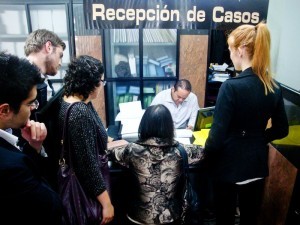The international community has long praised the Ecuadorian government for its willingness to provide protection to refugees and comply with the 1951 Convention on the Status of Refugees and the 1984 Cartagena Declaration on Refugees. However, amendments to the refugee status determination framework, namely Executive Decree 1182’s removal of the Cartagena Declaration definition of a refugee, and an increasingly restrictive procedural framework, demonstrate to what degree the political agenda has reduced the humanitarian space for refugees in Ecuador.

On October 2012, Asylum Access Ecuador presented a constitutional challenge to the Executive Decree 1182, arguing that the Decree had discriminatory procedures, violated the non refoulement principle, and precluded refugees from accessing basic human rights such as due process and the right to effective legal remedy. The University of San Francisco presented a parallel action and Human Rights Watch and Cardozo Law School both submitted amicus and briefs supporting the arguments.
This September, nearly two years after submitting the constitutional challenge, Asylum Access Ecuador was notified on the Constitutional Court’s decision. The Court, which has the power to review bodies of law and decide whether or not these uphold the Ecuadorian Constitution, partially accepted the constitutional challenge and ordered that the appropriate changes be made in the Decree, three of which are summarized below:
1) The Decree required a person to a file petition for legal status within 15 days of arriving in Ecuador, often just after receiving a death threat or seeing a family member murdered. This extremely short deadline resulted in the inadmissibility of nearly all applications. If an application was denied in the admissibility phase or the eligibility phase, the Decree required the applicant to file an appeal within 3 days or 5 days, respectively.
With the Court’s decision, refugees now have three months to file petitions for legal status, and 15 days to appeal a denial.
2) For more than 25 years, Ecuador had acknowledged the broader definition included in the 1984 Cartagena Declaration, a regional human rights instrument that establishes generalized violence as a causal to apply for refugee status. However, Executive Decree 1182 only contained the 1951 Convention definition, completely disregarding the broader, more inclusive concept developed in the Cartagena Declaration.
With the Courts decision, the legal definition set forth in the Cartagena Declaration has been reinstated, extending protection to refugees fleeing generalized violence.
3) The Decree stated that even if an individual had submitted an extraordinary appeal of revision the applicant could be deported, even if a final decision regarding their refugee condition had not been reached.
With the Court’s decision, this ruling was considered a direct violation of the non refoulement principle and has been consequently struck down.
Since advocating for the inclusion of refugees’ right to work in the 2008 Ecuadorian Constitution, enabling refugees in Ecuador to access safe and legal employment for the first time, AAE has tirelessly continued to advocate for the human rights of refugees in Ecuador.
The Court’s decision regarding Executive Decree 1182 represents an enormous victory for the effective protection of refugees in Ecuador.
“We’re thrilled that the thousands of refugees arriving in Ecuador from Colombia and elsewhere now will be able to depend on greater protection under Ecuadorian law,” said Asylum Access Ecuador director Karina Sarmiento. “We applaud the court’s courage in finding these provisions of Decree 1182 unconstitutional.”
Asylum Access Global Policy Director Jessica Therkelsen notes: “Ecuador has historically led Latin America on refugee rights. Decree 1182 marked an unfortunate detour from this leadership, and a contravention of Ecuador’s obligations under international law. While the new deadlines set by the Constitutional Court on Friday still do not fully accord with global best practice, the court’s decision marks a big step in the right direction and restores Ecuador to the path of leadership on this important regional human rights issue.”
To read the official press release regarding the Court’s decision, click here.
Written by Legal Services and Community Outreach Coordinator (Pichincha) Daniela Ubidia and Strategic Litigations Coordinator Estefanía Polit
